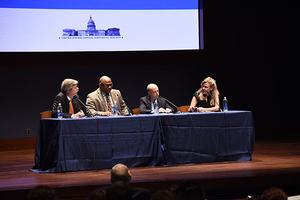Government & Politics
SPA Hosts Forum on Congress and the Separation of Powers

Scholars, researchers, and journalists gathered on Capitol Hill on Sept. 25 to discuss the theory behind the separation of powers between the branches of U.S. government and how that concept has played out in American history.
The forum was hosted by AU School of Public Affairs' Center for Congressional and Presidential Studies in partnership with the U.S. Capitol Historical Society and the U.S. Capitol Visitors Center.
“No principle of our constitutional form of government has been more debated, none of its practical functions have been more tested, and no prospect of its future success is more fraught with challenges than the separation of powers,” said Connie Tipton, vice chair of the U.S. Capitol Historical Society Board of Trustees.
David Barker, director of CCPS, developed the program, which included three panels and a dozen speakers. The event addressed the rationale behind the principal, how it has been interpreted over time, and its likely role in the future.
The founders thought separating the legislative, executive, and judicial powers would create a productive friction that would preserve citizens’ liberty, explained experts on the first panel. Washington, Jefferson, and Madison didn’t like political parties; their solution was to bring factions in government, said James Wallner, a CCPS fellow and adjunct professional lecturer at SPA.
“You need their conflict so you can buttress the walls that form the space in which politics occurs in the republic,” said Wallner at the forum. “For the first time in human history, Madison sees conflict as a virtue, not something to be eliminated … a virtue that will allow us to maintain a limited but energetic government.”
The executive branch has become much stronger than founders expected, and the speakers uniformly criticized Congress for abdicating its power. Rather than passing legislation, representatives are too often focused on getting re-elected and punting divisive issues, such as immigration or gun control, to the courts, said Wallner.
Ron Elving, senior editor and correspondent on the Washington Desk for NPR News and executive-in-residence for SPA, moderated a panel that explored the impact of the separation of powers on equal rights. Yuval Levin, SPA/BA ’99, vice president of the Ethics and Public Policy Center, said the system is designed so that no one branch has all the power; there have been shifts over time as to which branch leads on various issues.
“At different times, in different ways, people on different sides of conflict can take the side of institutions and take the argument that way,” said Levin. “The fact that the answer to who’s in charge is unresolved in the Constitution is the reason we can keep arguing about it.”
SPA Distinguished Professor of Government James Thurber wrapped up the forum by hosting a panel that examined party polarization and reasons that Congress has lost power. The growth of interest groups and constant pressure to raise money has contributed to Congress being unable to pass laws, said Norman Ornstein, resident scholar at the American Enterprise Institute.
“The term polarization is the wrong term. You could legislate with polarization,” said Ornstein, who instead says the deeply corrosive element is Congress is better labeled tribalism. “It makes it more difficult for parties to work together. It’s no longer working with an adversary who has very different views but who wants to solve problems. It’s sleeping with the enemy.”
As each side digs in because it doesn’t want to let the other get a win, the norms in Congress are eroding; Ornstein is not hopeful there will be a significant change in the rules or culture of the institution. However, if control of Congress passes to the Democrats in the November midterm election, Ornstein hopes there may be some much-needed oversight hearings on issues such as child separation at the U.S. southern border and the response to Hurricane Maria in Puerto Rico.
“There has not been a single hearing on corruption, and we have more corruption across cabinet officers than at any time in history. It makes the Gilded Age look pure by comparison,” said Ornstein. “This is an astonishing abdication of responsibility by the Congress. Maybe we can find some people willing to step up for that.”
